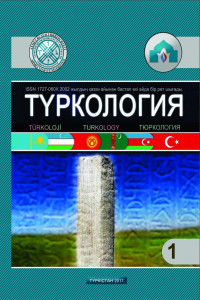ABU NASR AL-FARABI, THE FOUNDER OF ISLAMIC PHILOSOPHY
Anahtar Kelimeler:
Al-Farabi, medieval Islamic culture, philosophy, Әл-Фараби, ортағасырлық ислам мәдениеті, философия
ABU NASR AL-FARABI, THE FOUNDER OF ISLAMIC PHILOSOPHY
Medieval Islamic culture and philosophy are ahead of their time and today serve for the benefit of mankind. Al-Farabi, who became the second teacher, is a major figure in science. In the article, the author expresses his thoughts about the Turkic thinking, the Turkic worldview and the Turkish intellect through the philosophical teachings of al-Farabi.
Keywords:
Al-Farabi, medieval Islamic culture, philosophy, Әл-Фараби, ортағасырлық ислам мәдениеті, философия,
___
- Walzer, Richard. Encyclopdia ofIslam, Volume 2, al-Farabi, pp. 778-781, 1965 .
- Nasr, Seyyed Hossein & Leaman, Oliver. History of Islamic Philosophy, Part l, London and New York, 1996.
- Rosenthal, Franz. The ClassicalHeritage in Islam, London: Routledge, Kegan Paul, 1975 .
- Davari Ardakani, Reza. Al-Farabi, The Founder of Islamic Philosophy, Tehran: Second Edition: Iranian Academy of Philosophy, 1977; Forth Edition: Institute for Humanities and Cultural Studies, 1998.
- Davari Ardakani, Reza. Al-Farabi, The Philosopher of Culture, Tehran, Saghi Publication, 2004.
- Copleston, Fredrick. A History ofPhilosophy, Volume I (Greece and Rome), Part I (Pre-Socratic Philosophy, The Socratic Period, Plato) & Part 2 (Aristotle, Post-Aristotelian Philosophy), Translated into Persian by Seyyed Jalal al-din Mujtabavi, Tehran, Center for Scientific and Cultural Publications, 1983.
- Nasr, Seyyed Hossein. Islamic Philosophy from its Origin to the Present, New York, 2006.
- Corbin, Henry. Hstory ofIslamic Philosophy, Translated into English by Liadain Sherrard, London 2003.
- ISSN: 1727-060X
- Başlangıç: 2002
- Yayıncı: Hoca Ahmet Yesevi Uluslararası Türk-Kazak Üniversitesi
Sayıdaki Diğer Makaleler
ABU NASR AL-FARABI, THE FOUNDER OF ISLAMIC PHILOSOPHY
FAMLY TIES IN KARAKALPAk'S LIFE
PROBLEMS OF STATE STRUCTURE OF TURKIC PEOPLES IN THE ANCIENT TIME AND MlDDLE AGES
HISTORICAL DEVELOPMENT OF PARTS OF SENTENCE IN TURKIC LANGUAGES
HISTORY OF KARAKALPAK DECORATIVE ORNAMENTAL АRТ
THEORETICAL AND METHODOLOGICAL ASPECTS OF STUDYING THE NATURE AND HISTORY OF AN ETHNIC GROUP
INFLUENCE OF GEOGRAPHIC ЕNVIRОNMENT ТО MEDIEVAL TOWNS IN ТНЕ SOUTH KAZAKHSTAN
SEMANT'IC AND STRUCT'URE OF COMPOUND WORDS IN MODERN KARAKALPAK LANGUAGE
LANGUAGE UNITS EXPRESSING GREETING ETIQUETTE IN TURKIC LANGUAGES
NAZIRA TRADITION OF TURKIC POETRY PEOPLES IN THE WORKS OF SHADI
